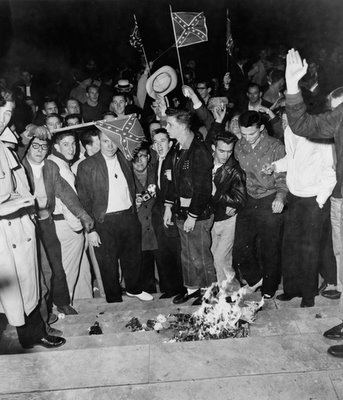The Addiction
I repeat: I do not think this. In this matter, I am supported by the sensible Buddhist teaching that all "conflicting emotions" are a source of immediate suffering when we experience them, and lead to actions which cause future suffering for us because of the karmic results. Insofar as my empirical experience is concerned, this is perfectly true.
Is such anger ever justified by the evil actions of others? We would like to think so. There is a perverse entertainment to be had in such justification, and this is part of the reason that anger leads so easily to our own bad actions. The longer we sustain anger with our own justifications, the more tempted we are to act unthinkingly and foolishly on it.
But before we go further, we need to ask this question: Do we need anger to discern evil? I think, self-evidently, not. If we don't need it to perceive evil, why do we need anger to act on evil? I can think of no action we might legitimately take to forestall evil, or to combat it that requires anger. Anger is merely a surplus pain, as well as a surplus pleasure, when combating evil. The pleasures of anger are, incidentally, addictive in the bargain.
So what then, is hatred? The Anchoress believes that hatred is "corrosive to the soul", which is why she differentiates from "justified anger". But when you look at hatred carefully, it is perfectly easy to see that hatred as simply anger recreated over and over when our addiction to it has taken hold. Hatred is anger as a long-term Jones. Though I am clearly politically prejudiced, some the strongest cases I have ever seen of this Jones are where the prominent targets have been successful public men of my own party: Ted Kennedy, Bill Clinton, and Jimmy Carter.
Now all of these men did things which might have angered any of us. Ted Kennedy behaved horridly, with few serious consequences, at Chappaquidoc. Bill Clinton had a sordid extramarital affair, actually in the White House itself, and he lied about it. And Jimmy Carter made a fair number of bad decisions as President, perhaps more than most.
But it seems to me that most conservatives whom I read on blogs and elsewhere are still badly addicted to whatever anger they may have had about any or all of these things, and that this anger passed into hatred long ago.
This is particularly the case with Jimmy Carter, who by now is merely a pious Christian octogenarian whose views are not very startling even if you disagree with them. But he is still the target for regular insinuations of treason or worse from half the Conservative blogosphere! Such things are nothing but pure pointless hatred and the parties who peddle it really do need a long session of emotional detox.
Further, the Anchoress' characterization of Bill Clinton as the "head deatheater" of a culture of abortion, assisted suicide, and euthanasia, is a ridiculous demonization of a fairly ordinary man, with much better than average political skills, as well as ordinary, and really not very interesting, moral flaws. Down home in the hills we would call him a Chicken Chaser, and be perfectly well aware that half the middle-aged men in town are as insecurely randy, and are also too weak to keep their jalapeno in their pants when it really is a matter of simple good sense to do so, beyond any moral issue involved.
And as to Ted Kennedy, it is hardly sensible to confuse the sins of his past, however bad they may have been, with his political actions and words in the present. His sins will be a matter of his own conscience and his own future, both now and after his death. His present opinions, no matter how strongly you disagree with them or how "justified" your anger is with them, are ones that can certainly be held with a clear conscience, even if they are wrong.
Three-quarters of my permanent critique of my conservative friends is that they can't bring themselves to see that last fact. And virtually the only reason I comment on, rather than merely reading their blogs, is to remind them that it is possible to disagree with them while looking them steadily in the eye with one's feet firmly planted in moral principle.
So do I ever get angry? Of course I do. Though less in recent years as age and illness have been catching up with me, and this way of diminishing your anger is morally neutral, a mere result of past karma. But I am in no way deceived about the toxic effects of clinging to anger as "justified", because you cannot acknowledge, even to yourself, that you really find the flavor of it to your taste. And I honestly do not think that I hate anything or anyone. I am committed by religious vows not to do this and, by and large, I have kept those vows.
A Buddhist works with anger in the same way as he works with any "conflicting emotion". He looks at it squarely and with as much unwavering attention as he can muster, without morally judging himself or his immediate emotivity. This is a hard thing to do, but when you succeed in doing it, you see that anger has no substance in and of itself. It is a mere appearance, like a rainbow, and that our feeling, when caught up in it, that it is somehow as solid as a chair or a wall is our misperception of the fact that anger is a tremendous, though indefinite well of pure energy.
The source of that misperception is the chronic feeling that our anger is somehow "justified". It is actually no more "justified" than a severe thunderstorm. "Justification" is simply not a relevant concept to apply to it. The energy of anger is actually something inherent in the world, and we merely distort it to our own childish ends, misusing something we have temporary access to, but is far larger than we are.
Baroness Alexandra, whose post I have linked to above, has commented that I am the most aggressive Buddhist she has ever seen, and she has openly wondered why I seem so little influenced by the example of His Holiness the Dalai Lama, who has, in recent years become something like the entire world's kindly uncle.
Well, beyond the immediate observation that His Holiness is a Buddha and I am a mere Buddhist, and not a very diligent one at that, there is also the fact that the point of being a Buddhist is how you respond to the conflicting emotions that you actually have, whatever they may be. I have aggression, lots of it, so I work with aggression. The starting point for such work is not trying to convince yourself that you are better than you act, as well as not trying to pretend that you can magically transform yourself into someone you, or the world, would like better than the current package.
I can't say a great deal about many of the specific Buddhist practices that I do, but I can say that some of them involve cultivating unwavering attention to things like the fact that the energy of anger is inherent in the world. After doing this for a while, you finally have to really grow up, because the childish clinging to your temper tantrums will, quite literally, knock you flat on your arse.
One of the first of the modern Buddhist teachers to reach the United States remarked some time ago that the spiritual path is not fun, and you had really better not start on it unless you can stay on it. This is another way of saying that you finally have to grow up.
But finally growing up is a very good thing to do.
Full Text








